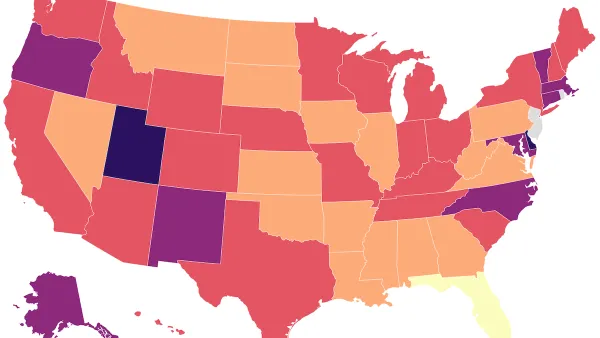Some media commentary suggests that fast-gentrifying cities such as Washington are unable to attract families. In Washington, the reality is more complex; the city's high-income neighborhoods actually gained children over the past decade.
One response to urban gentrification are the claim that even prosperous cities are childless cities, able to retain twenty-somethings but not to retain families. A recent study of Washington by the Urban Institute allowed me to analyze this theory on a neighborhood-by-neighborhood basis, rather than merely relying on citywide data.
In particular, I examined the Institute's division of the city into neighborhood clusters: groups of two or three similar areas. I found that some types of neighborhoods were indeed losing children, but that other parts of the District actually became more attractive to families over the past decade.
The city's traditionally low-income areas east of the Anacostia River did indeed lose children; every single neighborhood cluster east of the river had fewer children in 2010 than in 2000. In Ward 8 (the city's far southeastern corner) the number of children decreased by 16 percent during the 2000s. Other poor areas in eastern Washington sustained similar losses.
In newly gentrifying areas just east of Rock Creek Park, the number of children declined even more rapidly. For example, in the Mt. Pleasant/Columbia Heights neighborhood cluster (where the non-Hispanic white population nearly tripled between 1990 and 2010) the number of children decreased by 32 percent over the past decade. In this area, it appears that working-class families left and middle-class singles and couples took their place.
But in the city's always-affluent areas west of Rock Creek Park, the number of children increased in six out of seven neighborhood clusters. For example, in Georgetown/Burleith, the child population increased by 46 percent.
So it appears that (at least in Washington) long-established affluent neighborhoods are able to retain families.

Maui's Vacation Rental Debate Turns Ugly
Verbal attacks, misinformation campaigns and fistfights plague a high-stakes debate to convert thousands of vacation rentals into long-term housing.

Planetizen Federal Action Tracker
A weekly monitor of how Trump’s orders and actions are impacting planners and planning in America.

In Urban Planning, AI Prompting Could be the New Design Thinking
Creativity has long been key to great urban design. What if we see AI as our new creative partner?

Portland Raises Parking Fees to Pay for Street Maintenance
The city is struggling to bridge a massive budget gap at the Bureau of Transportation, which largely depleted its reserves during the Civd-19 pandemic.

Spokane Mayor Introduces Housing Reforms Package
Mayor Lisa Brown’s proposals include deferring or waiving some development fees to encourage more affordable housing development.

Houston Mayor Kills Another Bike Lane
The mayor rejected a proposed bike lane in the Montrose district in keeping with his pledge to maintain car lanes.
Urban Design for Planners 1: Software Tools
This six-course series explores essential urban design concepts using open source software and equips planners with the tools they need to participate fully in the urban design process.
Planning for Universal Design
Learn the tools for implementing Universal Design in planning regulations.
Gallatin County Department of Planning & Community Development
Heyer Gruel & Associates PA
JM Goldson LLC
City of Camden Redevelopment Agency
City of Astoria
Transportation Research & Education Center (TREC) at Portland State University
Jefferson Parish Government
Camden Redevelopment Agency
City of Claremont






























